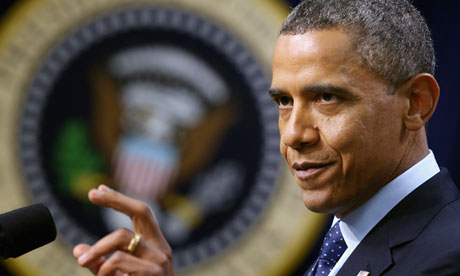There are three points that people should recognize about the fiscal cliff deal that appears to have been agreed upon by President Obama and the Republicans in Congress. The first is the simple and obvious point that we have gone over the cliff. There was no deal approved by Congress and signed by President Obama before the 1 January deadline.
This is important because the budget reporting on the "fiscal cliff" repeatedly asserted that the country and the economy faced dire consequences from not having a deal reached by this deadline. They repeatedly asserted that we risked a recession, grossly misrepresenting forecasts from the Congressional Budget Office, and others predicted the consequences of leaving higher tax rates and large spending cuts in place for the whole year.
There was also the prediction that the financial markets would melt down if there was no deal approved by the deadline. While the markets are not yet open, they actually rallied on the last day of 2012 on the news that the outlines of a deal had been agreed, even though the deadline would almost surely be missed.
In other words, the financial markets responded as many of us non-insiders predicted. As long as it was clear that a deal would be forthcoming, they didn't give a damn about the fiscal "cliff" deadline. Chalk this one up as yet another example of the experts -- the people who report on the budget and the economy for the Washington Post and other major news outlets -- not having a clue.
The second point has to do with the substance of the deal. For those who wanted to see key programs like Social Security and Medicare protected, this deal is pretty good news. The hare-brained idea of raising the age of Medicare eligibility to 67 seems to be off the table.
The plan to cut Social Security benefits by an average of 3% by changing the indexation formula for the cost of living adjustment is also, at least temporarily, off the table. The deal also continues the period of extended unemployment benefits, ensuring that 2 million unemployed workers will continue to receive checks.
On the revenue side, President Obama gave in to some extent, raising the threshold for applying the Clinton-era tax rates to $450,000, compared to the $250,000 level he had touted during his campaign. This is a gift of roughly $6,000 to very rich households, since it means even the wealthiest people will have the lower tax rate applied to $200,000 of their income. Perhaps more importantly, it continues the special low tax rate for dividend income, with the richest of the rich paying a tax rate of just 20% on their dividend income.
The resulting loss of revenue from these concessions is roughly $200bn over 10 years, or about 0.5% of projected spending during this period. By itself, this revenue loss would not be of much consequence; what matters much more is the dynamics that this deal sets in place.
This is the third point. President Obama insisted that he was going to stick to the $250,000 cut-off requiring that the top 2% of households, the big winners in the economy, go back to paying the Clinton era tax rates. He backed away from this commitment even in a context where he held most of the cards. We are now entering a new round of negotiations over extending the debt ceiling where the Republicans would appear to hold many of the cards.
While the consequences may not be as dire as the pundits claim, no one could think it would be a good idea to allow the debt ceiling to be reached and force the government into default. The Republicans intend to use this threat, however, to coerce further concessions from President Obama. The president insists that there will be no negotiations over the debt ceiling: no further concessions to protect the country's financial standing.
At this point, though, is there any reason for people to believe him?
This is a president who encouraged members of Congress to vote for the Troubled Asset Relief Program (Tarp) in 2008 with a promise that he would put bankruptcy cramdown for mortgage debt (allowing restructuring of housing loans for people with distressed mortgages) at the top of his agenda once he took office. This is a president whose top aids boasted about "hippie punching" when they ditched the public option in the Affordable Care Act. This is a president who has explicitly put cuts to Social Security on the agenda, while keeping taxes on Wall Street speculation off the agenda.
And this is a president who decided to put deficit reduction, rather than job creation, at the center of the national agenda -- even though he knows the large deficits are entirely the result of the collapse of the economy. And, of course, he is the president who appointed former Senator Alan Simpson and Morgan Stanley director Erskine Bowles to head his deficit commission, enormously elevating the stature of these two foes of Social Security and Medicare.
Given his track record, there is little doubt that President Obama can be trusted to make further concessions, possibly involving Social Security and Medicare, in negotiations on the debt ceiling. Oh well, at least we can laugh at the experts being wrong about the fiscal cliff "Mayan apocalypse."






